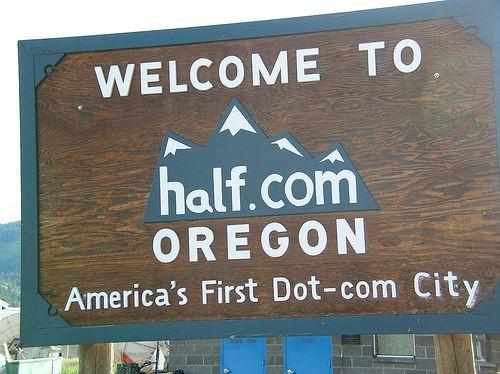
Photo via Project Guerrilla
I love buying books, especially online, especially through Amazon or Bookfinder or ABEbooks. (And yes, on eBay.) But the site I really love is Half.com. In it's early days, Half.com was an innovator and a Wall Street darling, a narrow service (no groceries, just books and music) that used a simple driver (ISBN), and, through its simple interface, promised a commitment to speedy delivery. Sadly, it was bought in June 2000 for $312.8 million by eBay, who wanted its customers (but not its fundamentally different business model). There was talk of shutting it down, but vociferous consumer protest persuaded eBay to back off. Half.com has never fully recovered, and today, it's sort of a second-rate site, one of eBay's more marginal subsidiaries. (In the same period, eBay also partnered with Sotheby's — another venture that went belly-up.)
But back in 1999, in its Netflix-like heyday, Half.com was hot. And then it did something quite remarkable. As a publicity stunt, it bought a town — somewhere in Oregon — and renamed it. This news made the wire services, The New York Times and Wired Magazine.
So what ever happened to Half.com, Oregon, the first dot com city in the world?
Halfway is a sleepy village, a farming and ranching community, halfway between Pine and Cornucopia, Oregon. The New York Times poetically described a town "tucked away in the shadow of the snowy Wallowa Mountains in eastern Oregon's sagebrush country, hard by the Idaho border." In the 2000 census, Halfway boasted a population of 337. (In the interest of full disclosure, let me just mention that my family originally hails from Browns Valley, Minnesota, population 690. Today, I live in the third smallest town in Connecticut: Falls Village, a rural hamlet with a whopping population of 1,081. Future biographers will likely report that small-town dwelling was in my genes.)
But company towns are completely different. A month ago, the Pacific Lumber Company announced that it was selling Scotia, California — along with its 275 houses — to its workers. "While this lovely little town has one of everything — a single supermarket, a single restaurant, and a single doctor — what is more notable is what it lacks. There is no city council, no mayor, no governing structure whatsoever. As the only landlord in town, Pacific Lumber provides the town's security, sewage treatment, water, power, maintenance, and, in the winter, free firewood." Without its owner, Scotia may have a hard time surviving.
Other towns have reconfigured their identities by renaming their towns themselves. Mauch Chunk, Pennsylvania renamed itself Jim Thorpe, Pennsylvania in 1954, when the widow of the sports star agreed to bury him there. in 1950, the town of Hot Springs, New Mexico, renamed itself Truth or Consequences — after the game show by the same name. More recently, Ismay, Montana changed its name to Joe, Montana — hoping to build profitably upon the name of the football superstar by the same name.
Then there's Braselton, Georgia, some 60 miles from Atlanta, purchased for $20 million in 1989 by the film actress Kim Basinger. (Four years later, when she was sued for backing out of a movie, Basinger was forced to sell it for just $1 million.) In West Homestead, Pennsylvania, the mayor has put the town's name on the block for $1 million, not unlike a stadium in search of a big-name sponsor. Poetry, Texas has recently been featured on the website of the Poetry Foundation, while Colson Whitehead's new novel, Apex Hides the Hurt, traces the story of a nomenclature consultant "trapped in the small town of Winthrop, deciding whether its name should be changed to Freedom (the name given it by liberated ex-slaves) or New Prospera (the brainchild of a software tycoon)."
Back in late 1999, the town of Halfway, Oregon wasn't looking for a sponsor. But a then-new internet startup called Half.com was looking for a gimmick — or, as Joshua Kopelman (Half.com's CEO) called it, "recognition as 'out-of-the-box' thinkers." They offered the town complicated packages (stock, internet access, free giveaways at the annual rodeo), and an implied series of long-term benefits, including a call center located right in town that would have translated to new jobs. In the end, the town received $110,000, 20 computers for its school, and a free town website. Today, nearly a decade later, the town site is no longer functional — for, as Kopelman himself notes: "This is the Net, and all contracts are short-term contracts." (One should remember the timeline: the deal with Halfway was approved in December 1999, and the $300+ million sale to eBay was in June 2000, making this perhaps the most cost-effective PR stunt in American history.)
Without an operative site in place, I hit the phones, calling local businesses like the Clear Creek Farm Bed & Breakfast, the Birch Leaf Guest House, the Hillside Bed & Breakfast and the Halfway Supper Club: no answer anywhere. I assumed Angela's Beauty Salon might be open for business on a summer afternoon — yet here, too: no answer. I left a message at Ronda Dillman Insurance Agency. Finally, I tried The Shop ("Need your car checked out? At The Shop, we don't just work on cars, we fix them."). A fellow named Gordon R. Kaesemeyer answered. He told me he was busy , but could give me a few minutes.
I asked him about the town's decision to rename itself Half.com, which, Kaesemeyer told me, turned out to be a rather short-term arrangement. "We just passed a proclamation that lasted for one year." I asked him whether the town actually got the money and computers promised by Half.com: "Yeah, we got our money and some computers," he assured me. " 'Course that just caused some problems like money always does." Encouraged by his answers, I thanked him for his time and asked him to put me in touch with Halfway's mayor.
"That would be me," he replied.
